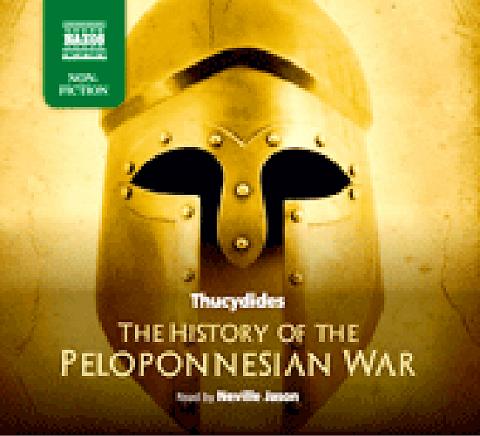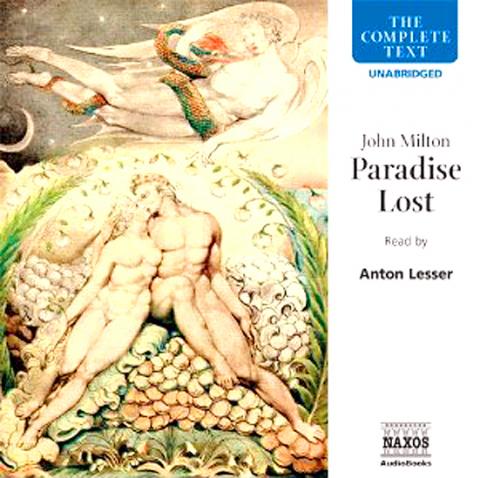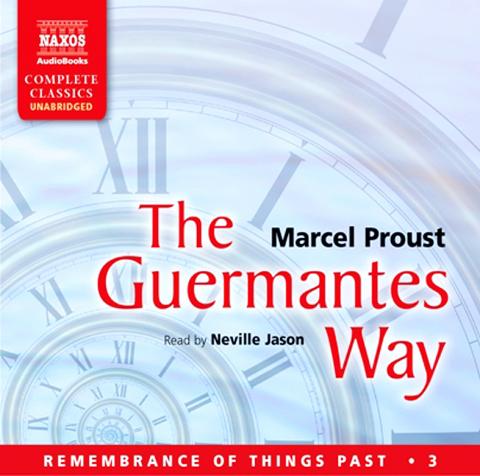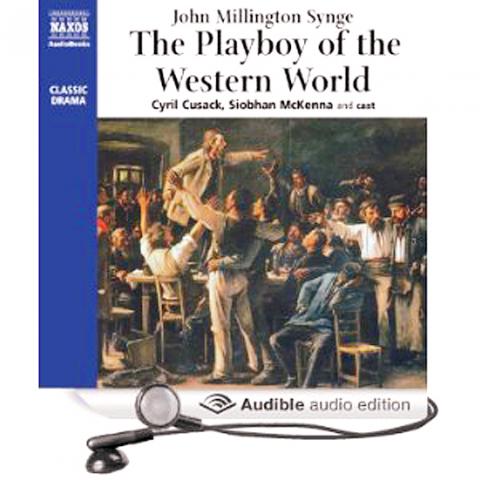THUCYDIDES, Translated by Richard Crawley, Read by Neville Jason, Naxos NA0069
PARADISE LOST, By John Milton, Read by Anton Lesser, Naxos NA 935012
THE GUERMANTES WAY, By Marcel Proust, Read by Neville Jason, Naxos NA 0098

VIRGIL’S AENEID, Translated by Cecil Day Lewis, Read by Paul Schofield and others, Naxos NA 427812
THE PLAYBOY OF THE WESTERN WORLD, By J.M. Synge, Cyril Cusack, Siobhan McKenna and others, Naxos NA 287612
This month and next we’ll take a break from music and instead review some of the riches contained in Naxos Audio Books. There are many other companies, of course, that offer CDs or audio downloads of books being read aloud. But I’ve recently had the opportunity to investigate Naxos’s catalogue in some detail, and so will concentrate on their audio CDs, and refer to other producers’ versions of the same books wherever feasible.

But there’s one reason why Naxos has the edge over its competitors. This is that they’ve managed to get hold of quite a large number of British BBC recordings from their radio drama archives, classic plays performed by incomparable actors. No one else can quite match this superb treasure trove.
Naxos, as if to cap its own already prodigious achievement — it has over 700 audio CDs available — is in the process of issuing the whole of Marcel Proust’s A la recherche du temps perdu (Remembrance of Things Past in this translation), uncut. They issued an abridged version ten years ago, read by the unstoppable Neville Jason, and now Jason has just completed the entire thing. There’s a podcast online in which he looks back on the experience as being less daunting than he’d expected. Naxos, though, are taking it easy and issuing the seven books one at a time. Four have appeared so far, and the third, The Guermantes Way, is as good a one as any to consider.
This Naxos version uses the original translation by Scott Moncrieff. Which translation of Proust’s masterwork you prefer is a notoriously contentious territory, but there are strong reasons for opting for the Scott Moncrieff version beyond its copyright availability. It’s been re-issued in a supposedly new version, revised by Terence Kilmartin, but what was sometimes overlooked was that Kilmartin only made on average three changes per page. Penguin’s more recent version, with a different translator for each book, was widely judged to lack the stylistic cohesion that a talented single translator, especially unrevised, could provide.

As for the reading, Neville Jason offers an easy, relaxed tone to carry us through the enormous length of the work. His rendition of the gay tailor, Jupien, early in Sodom and Gomorrah (the fourth book) may appear too mannered to some, but generally his approach is congenial, relaxed, and appropriately ironic where necessary.
Jason is a mainstay of the Naxos operation, being also responsible for the whole of War and Peace on 51 CDs. He is in addition the main reader of one of Naxos’s newest products, an abridged version of Thucydides’s The History of the Peloponnesian War (7 hours, 15 minutes on six CDs). The styles of Proust and Thucydides could hardly be more different, but Jason, using subtle variation, takes them both in stride.
Poetry must be included in any overview of an audio-book collection, and a representative item is Milton’s Paradise Lost, read here by Anton Lesser. His reading style is eager, light, dramatic and quite fast — appropriate, it might be thought, considering that Milton’s Latinate style all too often tends in the opposite direction. Music is added here and there, and this version does a lot to make what might in other circumstances be a forbidding experience pleasant and congenial.

There’s a lot of competition in the field, however, not least from Charlton Griffin, reading the epic poem for Audio Connoisseur. His version is highly flavored, deeply theatrical and at times even richly sarcastic. He’s as much a stalwart of his company as Jason is of his, being responsible for the Iliad and Odyssey, both unabridged, as well as the complete Sherlock Holmes stories, plus some selections of US short stories, for which he assumes a not always very convincing American accent.
It isn’t always the case that Naxos first issues abridged readings, and then follows them up with the complete version. Sometimes it’s the other way round, as in the case of Virgil’s Aeneid. This has a stellar narrator in the veteran British actor Paul Schofield and was issued complete in 2007. Naxos has just issued it in an abridged version, on four CDs; the translation used is by Cecil Day Lewis.
Lastly, one of the priceless radio versions of classic stage plays. There are many of these, but J.M. Synge’s The Playboy of the Western World, with what sounds like an all-Irish cast, would be hard to improve on. It dates from 1973, and stars Cyril Cusack, an actor who made over 150 films if TV dramas are included. His recordings of Beckett are legendary (I’ll never forget his Embers), and here he plays Christie Mahon, the “playboy”, with all the evocative enthusiasm and feigned melancholy at his disposal.


June 23 to June 29 After capturing the walled city of Hsinchu on June 22, 1895, the Japanese hoped to quickly push south and seize control of Taiwan’s entire west coast — but their advance was stalled for more than a month. Not only did local Hakka fighters continue to cause them headaches, resistance forces even attempted to retake the city three times. “We had planned to occupy Anping (Tainan) and Takao (Kaohsiung) as soon as possible, but ever since we took Hsinchu, nearby bandits proclaiming to be ‘righteous people’ (義民) have been destroying train tracks and electrical cables, and gathering in villages

Dr. Y. Tony Yang, Associate Dean of Health Policy and Population Science at George Washington University, argued last week in a piece for the Taipei Times about former president Ma Ying-jeou (馬英九) leading a student delegation to the People’s Republic of China (PRC) that, “The real question is not whether Ma’s visit helps or hurts Taiwan — it is why Taiwan lacks a sophisticated, multi-track approach to one of the most complex geopolitical relationships in the world” (“Ma’s Visit, DPP’s Blind Spot,” June 18, page 8). Yang contends that the Democratic Progressive Party (DPP) has a blind spot: “By treating any

This year will go down in the history books. Taiwan faces enormous turmoil and uncertainty in the coming months. Which political parties are in a good position to handle big changes? All of the main parties are beset with challenges. Taking stock, this column examined the Taiwan People’s Party (TPP) (“Huang Kuo-chang’s choking the life out of the TPP,” May 28, page 12), the Democratic Progressive Party (DPP) (“Challenges amid choppy waters for the DPP,” June 14, page 12) and the Chinese Nationalist Party (KMT) (“KMT struggles to seize opportunities as ‘interesting times’ loom,” June 20, page 11). Times like these can

Swooping low over the banks of a Nile River tributary, an aid flight run by retired American military officers released a stream of food-stuffed sacks over a town emptied by fighting in South Sudan, a country wracked by conflict. Last week’s air drop was the latest in a controversial development — private contracting firms led by former US intelligence officers and military veterans delivering aid to some of the world’s deadliest conflict zones, in operations organized with governments that are combatants in the conflicts. The moves are roiling the global aid community, which warns of a more militarized, politicized and profit-seeking trend